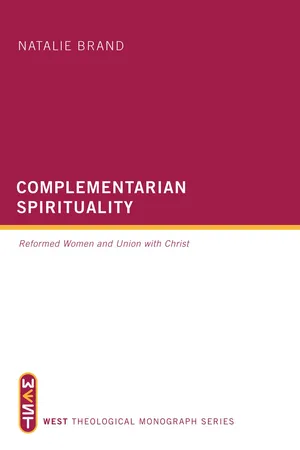![]()
1
Introduction
It has been said that contributions on Reformed spirituality “are as rare as hen’s teeth.”1 In a similar tone, Reformed theologian Joel Beeke laments a dearth in Reformed spirituality: “we confront the problem of dry Reformed orthodoxy, which has correct doctrinal teaching but lacks emphasis on vibrant, godly living. The result is that people bow before the doctrine of God without a vital, spiritual union with the God of doctrine.”2 Conservative theologian J. I. Packer also appeals for further work in the subject of spirituality.3 In noting the countless number of Evangelical works on Christian living lining the shelves of Christian bookshops, it is probable that Cornick and Beeke are calling for contributions that are distinctively Reformed as well as pastorally effective, that is, material grounded in the theological and spiritual legacy of the Reformed tradition throughout the centuries, undiluted by the individualism and conversionism of Evangelical spirituality.
It seems, therefore, that the Reformed tradition has some work to do; at a time when spirituality is high on the agenda of today’s popular culture, from “Hollywood to politics,”4 the Reformed tradition should not fail to respond in line with its rich spiritual heritage. Therefore, there remains a need to examine contemporary Reformed spirituality and its unique theological contribution to spiritual formation; to test whether it is truly effective to Reformed believers under its wing as they seek to know, glorify, and enjoy the triune God in contemporary life, and to contribute new articulations accordingly.
As we unpack this book’s central features by highlighting our aims, we will also consider the structure of the work and introduce the terms basic to this discussion. This will give the reader necessary background for our later exploration into a complementarian spirituality. In this chapter we will also look briefly at the contemporary movement in spirituality, its impact on Christian and Evangelical spirituality, and attempt to characterize Reformed Spirituality in its contemporary mode.
Aims
This work is an exploration into an approach to Reformed spirituality that is anchored in the believer’s union with Christ. We will achieve this by investigating the posture and theological nature of the doctrine of “union with Christ” in the Reformed tradition, then presenting a particularly feminine articulation of its significance and relevance for a contemporary Reformed spirituality, in both corporate and personal spiritual formation.
The need for the subject of spirituality to be addressed is evident in the declaration of a “crisis” time in Evangelical spirituality, wherein some forms have been labeled “modern Gnosticism.”5 Pentecostalism and general Evangelical spirituality have been characterized, together with contemporary American religion as a whole, as “inward, and deeply distrustful of institutions, mediated grace, the intellect, theology, creeds, and the demand to look outside of oneself for salvation.”6 This of course can be devastating to the spiritual lives of the Reformed since many possess an Evangelical expression of spirituality, for it is vital to acknowledge cross-fertilization between traditions and denominations. This cross-fertilization, which has seemingly contributed to the weak contemporary representation of Reformed spirituality, is exemplified in the noticeable influence of Evangelical individualism upon Reformed spirituality. Howard Hageman comments on this in his affirmation for a renewal in American corporate worship in line with Calvinistic spirituality.7
This unfortunate shaping of Reformed modes of worship by unbiblical or extra-biblical Evangelical ideals proves the dynamic nature of spirituality in culture. Thus, the study of spirituality cannot be subject to a denominational vacuum or one specific context of historical Christendom. Yet some delineation of a contemporary biblical spirituality is paramount for the continuing life of the Reformed tradition specifically and Protestant churches in general.
Similar to the above assertions that the subject of Reformed spirituality has undergone neglect in scholarly theology and church life, it is held by some that the doctrine of union with Christ, though labeled as “most important” and “most profound,” has also suffered in this manner.8 Tudur Jones hails union with Christ as “an integral stage” in the order of salvation. He writes, “it is therefore all the more surprising that while justification and sanctification have had their share of theological consideration there has been a deep and prolonged silence about union with Christ.”9 This is the case in both popular and academic Reformed and conservative Evangelical works on the Christian life, demonstrated in the author’s undertaking of a literature review.10 At this point one might interject that the unio mystica’s usual treatment as a soteriological category in Reformed theology might have restricted the doctrine from any wider application in spirituality. Indeed, this disregard might be owing to the brevity of Protestant spiritual writings, which Don Carson contrasts to Catholicism’s reams and the legacy from the Catholic mystics of other centuries emphasizing perfection and mystical union.11 Consequently, it seems Protestants may have tended to avoid this doctrine and its spiritual applications due to heavy reliance on it in Catholic mysticism.
In light of this unfortunate neglect, our first aim is to reassert this doctrine and reflect on how it can stimulate the Reformed tradition to an appreciation of Christian spirituality that is more in line with its historical-theological heritage, particularly Calvinism. For, “the heart of Calvin’s theology and spirituality is the mystical union between Christ and the believer.”12 Mark Garcia notes, “it has long been appreciated that the Calvin corpus contains numerous passages in which the theological, ecclesiological, and practical significance of union with Christ is prominent.”13 The legacy of Puritanism to the Reformed tradition also calls for contemporary appreciation of this doctrine, which has been designated “the existential nerve of...
